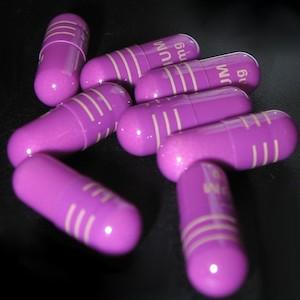Acid reflux is an unpleasant condition. Not only is it uncomfortable, but experiencing chronic acid reflux (known as GERD, or gastroesophageal reflux disease) may cause esophageal cancer.
Thankfully, there is medication to treat it. One of the most famous is a little purple pill called Nexium that, as Dr. Josh Bloom describes in one of the best articles ever written for ACSH, was a $48 billion rip-off orchestrated by AstraZeneca. Still, the pill really does work due to a mechanism called proton pump inhibition.
Acids are made of protons (i.e., hydrogen atoms with their lone electrons removed). A rather complex molecular mechanism is responsible for acidifying our stomachs, but the gist is that protons make their way into our stomachs via specialized pumps. The operation of these pumps can be blocked by proton pump inhibitors (PPIs), such as Nexium, which helps relieve the symptoms of acid reflux.
People who have chronic issues with acid reflux may be taking this medication for a very long time. This is a double-edged sword. On the one hand, PPIs may lower the risk of esophageal cancer and eliminate the need for stomach surgery. On the other hand, long-term use of PPIs has been linked to nasty side effects, such as kidney failure and dementia. Are these reported side effects real?
Nexium Side Effects: Real vs. Reported
To answer that question, Dr. Rena Yadlapati and Dr. Peter Kahrilas critically examined the existing literature. Some of the reported side effects, such as vitamin B12 and iron deficiency (both of which ultimately result from a decrease in stomach acid), are real. Furthermore, because stomach acid kills bacteria, people who take PPIs are also more prone to foodborne infections, such as Salmonella. However, the authors were skeptical of some of the other reported side effects.
In theory, for instance, a drop in stomach acidity could be linked to gastric cancer. Additionally, an observational study linked PPIs to heart attacks. Yet, upon further scrutiny, neither was shown to occur. After reviewing the relevant literature, Drs. Yadlapati and Kahrilas constructed a diagram that details all the possible side effects. (Note: Black arrows indicate observed links, whereas red arrows indicate hypothetical links.)

The authors forcefully conclude: "The low quality evidence surrounding chronic kidney disease, myocardial infarction, bone fracture, and dementia is not at all compelling. Hence, currently available data do not support altering evidence-based PPI use on the basis of these hypothetical risks."
So, if you are taking PPIs long-term, don't worry about those risks. Instead, focus on iron and vitamin B12 deficiency, as well as any potential microbiota imbalances. These are established risks, and they are treatable.
Importantly, the authors give us a broad reminder:
Clearly, observational studies have their limits and until verified by prospective controlled data, findings from observational studies, especially findings of weak association, should be viewed as hypothesis generating. These studies are inherently flawed by an inability to establish causality, unmeasured confounders, inaccurately measured confounders, and unaccounted for biases.
That is worth repeating: Observational studies (e.g., case-control and cohort studies) are inherently weak. Before we radically alter our behavior or change standard medical practice, we should verify any such studies with more controlled studies.
Somebody, please inform our sensationalist media.
Source: Yadlapati R, Kahrilas PJ. "The 'Dangers' of Chronic Proton Pump Inhibitor Use." Journal of Allergy and Clinical Immunology. Published: 2017. doi: 10.1016/j.jaci.2017.06.017.




